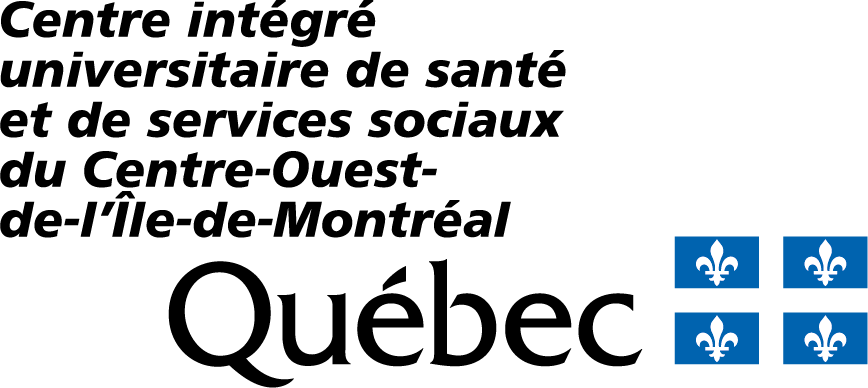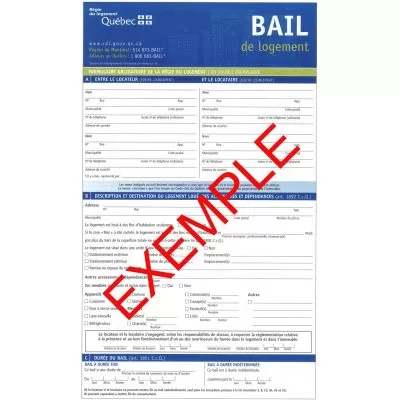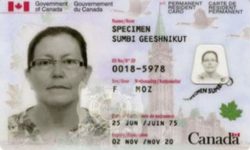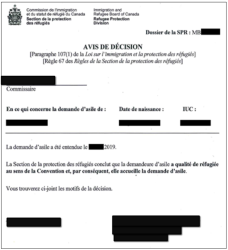Carnets de route contains information specifically aimed at refugees and refugee claimants, as well as the people assisting them. Carnets de route is intended to help you with the process of settling in when you arrive and during your first few years in Québec.
With Carnets de route, you will enjoy an engaging experience: reliable, organized and accessible information about Québec society, steps to take, to-do lists, timelines, summary diagrams and much more!
Select whether you would like to view the website in English or French, then answer the following three questions to be directed to the right information.

Your profile
Refugee Claims
Accepted Refugee Claims
Refused Refugee Claims
Refugees
Housing
Key organizations and individuals
1. Updates – Housing
The content of Carnets de route was updated in November 2023, unless otherwise indicated. Some elements may have changed since then. If in doubt, consult the sources and resources in this section. You can also report any information requiring change through Technical Support. Update dates may vary by section.
2. Vocabulary
(Collectif Bienvenue, 2023f; Ville de Sherbrooke, 2023g)
Tenant
The person who rents the property and pays the rent (that’s you).
Property owner
The person or company who owns the property, to whom you usually pay rent (also known as the landlord).
Building custodian
Your building may have a building custodian. Generally, the building custodian cleans and repairs the building. You may have to pay the rent to this person and contact them if you have any problems.
For simplicity’s sake, we will use the word “property owner,” although in some cases the content may refer to the building custodian.
Roommates
If you share your apartment with one or more people, they are your roommates. Roommates share the cost of rent and other expenses (electricity, Internet, etc.).
Guarantor
A guarantor takes responsibility for the apartment, including paying the rent for you if you don’t pay.
Credit history
This is a record of your financial situation, indicating whether you have any debts and whether you are in a position to repay them. Property owners often check the credit history of prospective tenants.
Lease
The contract signed between you and the property owner.
Apartment
A type of housing that generally has multiple rooms.
Studio
An apartment with one room and one bathroom.
Furnished
The apartment comes with:
- Basic furniture (beds, table, chairs, etc.)
- Appliances (refrigerator, oven, washer, dryer)
Sometimes the appliances included in the apartment have an additional cost per month and will not belong to you at the end of the lease.
Semi-furnished
The apartment comes with:
- A refrigerator and oven
- Sometimes a washer and dryer
- Sometimes some basic furniture
Unfurnished
The apartment comes empty.
Utilities included
Expenses related to heating, electricity and sometimes Internet access are included in the rent.
Heat and electricity
Heat and electricity costs are included in the rent.
Lease
A property owner rents you an apartment. You sign a lease.
Sublease
A tenant leaves for a period of time (a few months, for example) and sublets their apartment to you. You pay the rent to the tenant. You sign a notice to sublet the dwelling.
Assignment of a lease
A tenant moves out before the end of their lease and you take over their apartment. You pay the rent to the property owner. You sign a notice of lease assignment.
Temporary accommodation
This is the place you stay for a few weeks or months when you arrive in Québec.
Permanent accommodation
This is the place you move in to long term. Since it is currently hard to find a place to live in Québec, you may have to wait several months before moving into your permanent accommodation.
1 1/2
One room + one bathroom
2 1/2
Kitchen + bedroom + bathroom
3 1/2
Living room + kitchen + bedroom + bathroom
4 1/2
Living room + kitchen + two bedrooms + bathroom
OR
Living room/open bedroom + kitchen + closed bedroom + bathroom
5 1/2
Living room + kitchen + three bedrooms + bathroom
OR
Living room/open bedroom + kitchen + two closed bedrooms + bathroom
3. When you arrive
4. Finding a place to live
(Collectif Bienvenue, 2023f; Fédération de l’habitation coopérative du Québec, s. d.; IRCCImmigration, Refugees and Citizenship Canada , 2023o; TCRITable de concertation des organismes au service des personnes réfugiées et immigrantes , 2021; Ville de Sherbrooke, 2023g)
“Be patient at first, because it is not easy to find a place to live. The idea of fighting to find a place to live is something you will have to quickly wrap your head around. My advice is to actively seek out community groups, because they can help you find housing leads.” – Mariam
“There are Facebook groups made by and for the 2SLGBTQIATwo-spirit, lesbian, gay, bisexual, trans, queer, intersex, asexual and additional sexual orientations and gender identities + communities, where people can interact and ask questions. For example, one group is dedicated to finding a home, another to finding a job. There is a dynamic of solidarity and sensitivity toward refugee claimants and refugees in these groups.” – Mariam
5. Lease and associated costs
(Collectif Bienvenue, 2023f; Éducaloi, 2023i; Ville de Sherbrooke, 2023g)
Make sure you change your address and email. See 3. Change of address and contact information in the Read This Information First section to find out which authorities you must inform of the change.
5.1 Signing the lease
Before moving in and paying rent, you must sign:
- A lease

- OR a sublease agreement
- OR an assignment of lease agreement
5.2 Home insurance
Home insurance protects you in the event of an unfortunate incident, such as a fire, theft, water damage, etc. Without insurance, you would have to pay all the costs associated with the incident, which can be extremely high. If something happens and you lose the belongings in your apartment, home insurance can also reimburse you an equivalent amount of money.
A number of companies offer affordable home insurance. There are insurance comparison engines online that can help you find good prices.
5.3 Electricity and heating
Once your lease is signed, you must open a customer account with Hydro-Québec to obtain and pay for electricity.
In Québec, electricity is used to turn on the lights, heat apartments in the winter and run household appliances like the refrigerator.
If the property does not come with heat and electricity, you will have to pay for these utilities. You can check your home’s monthly heating and electricity costs on the Hydro-Québec website: Estimate the electricity cost of a home.
Some apartments are heated with natural gas. For these apartments, you need to open an account with Énergir.
Hydro-Québec
Énergir
5.4 Renewing your lease
(Éducaloi, 2023g; Tribunal administratif du logement, 2023a)
Every year, your property owner will usually send you a notice of lease renewal a few months before the end of your lease.
If there are changes to the lease or conditions, you must receive a notice of lease renewal:
- One to two months before the end of your lease, for a lease less than one year or for an indefinite term
OR
- Three to six months before the end of your lease, for leases of one year or more
Read this notice carefully and check for a rent increase or a change in conditions.
If you do not want to renew your lease or if you disagree with the changes, you must notify your property owner in writing as soon as possible, at least a few months before the end of the lease.
Note that if you do not respond to the notice of lease renewal, the lease will automatically be renewed under the new conditions.
If your property owner does not send you a notice of lease renewal, the lease will be renewed automatically with the same conditions.
6. Financial assistance for housing
(Collectif Bienvenue, 2023f; MIFIMinistère de l’Immigration, de la Francisation et de l’Intégration (du Québec) , 2023; Services juridiques de Pointe-Saint-Charles et Petite-Bourgogne, 2017; Ville de Sherbrooke, 2023g)
6.1 Shelter Allowance
(Revenu Québec, s. d.-a, 2023c, 2023a; Société d’habitation du Québec, 2023a)
The Shelter Allowance gives you at least $100 a month to help pay for rent.
6.1.1 Eligibility criteria
You can apply to the Shelter Allowance program:
- If your rent is 30% or more of your income (you are not eligible for it if you have social housing or receive the RSPRent Supplement Program )
- If you are a low-income family
- If you or your spouse have at least one dependent child
OR
you or your spouse are aged 50 or over
6.1.2 To apply
Online through “My Account”
Register or log on to Revenu Québec’s Web platform “My Account”: My Account – Revenu Québec. Click on Menu – Programs – Apply for the Shelter Allowance.
By mail – downloaded PDF documents
Fill out the form LEX-165 Shelter Allowance Application and send it and the other required documents to the address indicated on the form.
By mail – documents sent by mail
Call 1 855 291-6467 to receive the documents to complete in the mail, and mail them to the address indicated on the documents.
You must reapply for the Shelter Allowance every year.
6.1.3 For more information
For more information about the Shelter Allowance and steps to follow: 1 855 291-6467 Shelter Allowance Program | Revenu Québec
7. Housing rights
7.1 Obligations
(Collectif Bienvenue, 2023f; Éducaloi, 2023i; Haut-Commissariat des Nations unies aux droits de l’homme, 2009; New Canadians Centre Peterborough, 2018; Services juridiques de Pointe-Saint-Charles et Petite-Bourgogne, 2017; Tribunal administratif du logement, 2023b)
In Québec, property owners and tenants have rights and obligations when it comes to housing.
Property owner’s obligations:
- Make sure the property is in good condition when you arrive
- Keep your home in good condition:
- Deal with infestations of insects (bedbugs, cockroaches, etc.) or vermin (mice, rats), as well as mould and mildew
- Perform any repairs to make the apartment functional
- Notify you 24 hours in advance before entering your apartment, for example to make repairs
- Refrain from discriminating against you
- Refrain from evicting you without a good reason
Your obligations as a tenant:
- Pay the rent each month on the agreed date
- Keep the apartment clean and in good condition
- Notify the property owner if something is not working or if insects, vermin or mould are found in the apartment
- Repair any damage that you cause
- Keep noise down to respect your neighbours
- If you don’t want to renew your lease, send a notice as soon as possible
- Return the property in the same condition as when you arrived
- Ask your property owner’s permission before making any changes to your home, such as painting
“At first, finding a place to live wasn’t easy because our family is large (four children, three adults). The noise from the children and visits from our friends disturbed our neighbours. It was hard to communicate with our neighbours in French. Eventually, I found another place to live, and explained to the property owner that my children are very energetic and make a lot of noise. She didn’t object and we’ve been living here for 3 years.” – Ali
Bedbugs are very small insects that live in furniture and are very invasive and harmful. If you suddenly find bites on your body, beware. Also carefully inspect any furniture you find on the street. Don’t bring used mattresses home.
7.2 If you have a problem
If you have a problem with your apartment, there are various potential solutions.
Examples of problems you may face:
- The apartment is unfit to live in (repairs required, vermin, mould, etc.)
- Threat of eviction (the property owner wants to evict you)
- Excessive rent increase when the lease is renewed
Potential solutions:
- Discuss the problem with the property owner
- Ask for help from a housing committee or organization
- If necessary, find a lawyer. You may be eligible for legal aid. See Access to a lawyer and other legal resources in the Read This Information First section
- Ask for help from a community justice centre
- File a complaint with the TALTribunal administratif du logement , which is there to defend your housing rights
Asserting your housing rights will not affect your immigration status.
Dealing with the TALTribunal administratif du logement can be daunting and complicated. There are organizations that can help.
TALTribunal administratif du logement
Find a housing committee – Coalition of Housing Committees and Tenants Associations of Québec
7.3 For more information
See the Guide du locataire avisé Chez moi by the Comité d’accueil international des Bois-Francs and other partner organizations: Guide du locataire avisé [French only]
8. For more information
Canadian Orientation Abroad Participant Workbook – IOM
Multilingual
Participant workbook: Canadian Orientation Abroad Participant Workbook – IOM
“O Canada – conversations dialogue” audio guide: Canadian Orientation Abroad: O-Canada Conversations
“O Canada” mobile application: O Canada – App Store
For additional information and exercises on many aspects of this Carnets de route section, see chapter “Housing”, pages 81 to 92, in the Canadian Orientation Abroad “Participant’s Workbook”.
You can also listen to the audio guide “O Canada – Conversations Dialogue” and download the application “O Canada”.
To-do list
See the Housing section of the Carnets de route website to learn about key terms, as well as your rights and responsibilities and those of the property owner in relation to housing
Find a place to live with help from your host organization or sponsorship group
Bring someone with you to the visits, if possible
After you find a place to live
Sign the lease, sublease agreement or assignment of lease agreement
- If you make a security deposit, ask for a receipt
Open an account with Hydro-Québec or Énergir before moving in
Date to pay your Hydro-Québec or Énergir bill (electricity and heating; once a month or every two months):
Take out home insurance before moving in
Date when your home insurance must be paid:
Take note of when the lease is up for renewal and any renewal conditions
Deadline for giving notice to the property owner if you do not want to renew your lease (varies – a few months before the end of the lease):
Deadline for property owners to send you notice of a rent increase:
Familiarize yourself with the building rules and the appliances in the apartment, if necessary
Report a change of address as soon as possible: see the Read This Information First section
Date you moved into your current apartment (it is very important to change your address and arrange to have your mail forwarded as soon as possible before or after this date):
See the Housing section of the Carnets de route website to learn about financial assistance for housing
Appy for the Shelter Allowance, if eligible
If you are having an issue, contact your local housing committee, the TALTribunal administratif du logement , a lawyer or a community justice centre


